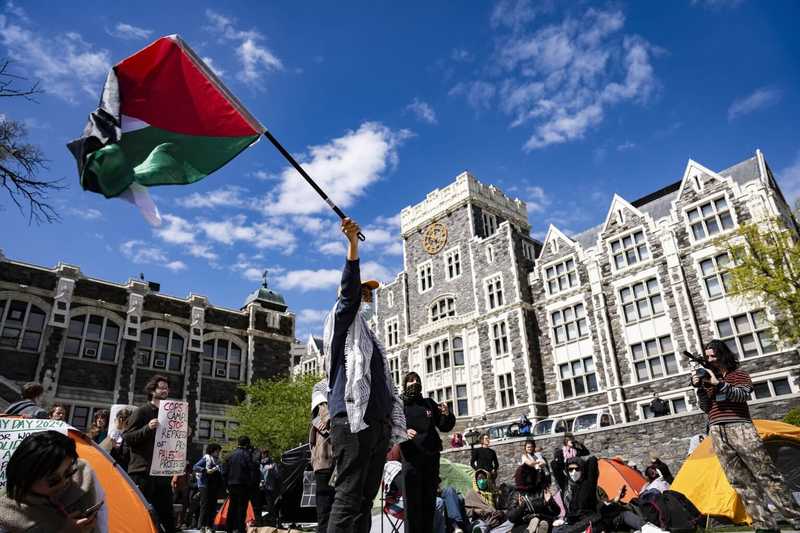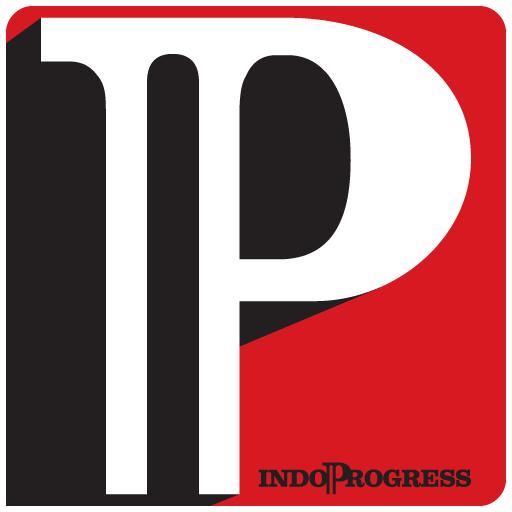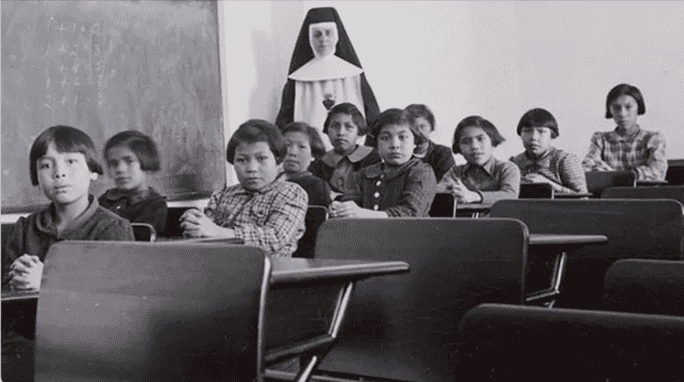
It’s all a distraction.
The fanfare over outside agitators, over how many students were involved (or not), over whether flares were lit (or not), over whose freedom of speech was infringed upon (or not), over which administrators said what, and when, and how —
It’s all a distraction.
From the fact that Israel is now bombing tents in the most populated parts of Rafah, an area the size of Newark into which 1.4 million people have been forced.
The fact that Israel has now sealed the border with Egypt, cutting off life-saving aid as it extends its policy of mass starvation.
The fact that the sky in Gaza is once again full of leaflets, glimmering like confetti as they spiral towards Earth with their message of death.
The fact that 520 bodies have been recovered from mass graves outside al-Shifa Hospital, Nasser Hospital, and Kamal Adwan Hospital, bodies zip-tied and wearing hospital scrubs, bodies tortured, bodies beheaded.
The fact that those of us with friends or with family in Rafah are now receiving messages like this one, sent to a comrade yesterday: “If connection is lost and I seem to be offline for an extended period, please know that I may have departed, and the worst may have occurred. But do not worry my dear friends. In this unjust world, we will find solace in heaven where we will rest eternally.”
It’s all a distraction.
The students know this
The students know this, and this is what makes us a threat. Their tools of intimidation cannot work against us as long as we remain focused on Gaza. Witness the following exchange between a reporter and a student protestor from the University of Chicago:
You’re a student?
Yes, I’m a PhD student.
Any discipline?
Again, I don’t care, it doesn’t matter. There are things that matter more than my academic future. And certainly every one of those children, that is being murdered, starved, maimed, whose parents are having to choose, do I let this kid starve first or that one. This is such an ugly reality of such great magnitude that to really think, to even entertain questions about like, ‘Oh, what might happen if Paul puts me on a leave of absence’ is ridiculous, and it’s insulting, to the memory of every child who has been murdered in the course of this genocide, with the full complicity of the United States, of Joe Biden, and of people like Paul Alivisatos, and his cops that he sics on us in the middle of the night.
‘The world can’t take it away’: learning from Palestinian resistance
On the same day that President Vincent Boudreau unleashed the brutality of the NYPD Strategic Response Group (SRG) on the City University of New York’s Gaza Solidarity Encampment, singers from the Resistance Revival Chorus came to perform for us. Standing in the sunlight under a flagpole onto which we had hoisted the Palestinian flag, they sang Shirley Caesar’s Black gospel classic, “This Joy.”
“This little joy I have,” the song goes, “the world didn’t give it to me…the world didn’t give it, the world can’t take it away.”
The fact that protestors from Gaza solidarity encampments across the country have been filmed singing this song as they are hauled away by cops is telling. It testifies to a spirit that state violence, try as it may, cannot reach. This spirit did not emerge with the students. It draws on long histories of Black and Indigenous resistance on this continent; it is also profoundly inspired by Palestinian resistance. Witnessing protestors smiling as they are dragged away by police, we see echoes of images of Ahed Tamimi handcuffed between armed guards and smiling, or Walid Daqqah smiling and giving a peace sign as he is taken away. Palestinian activist and musician Mariam Afifi, when asked in 2021 why she smiled after her own brutal arrest, said “I was not afraid because I believe that I am right.”
At the CUNY Gaza Solidarity Encampment, we gathered each day to read Palestinian poetry, infused with the spirit of this resistance. This spirit ran like a current of electric joy through the camp.
We shared these words from* “What I Will”* by Suheir Hammad (2005):
I will not lend my name
nor my rhythm to your
beat. I will dance
and resist and dance and
persist and dance. This heartbeat is louder than
death. Your war drum ain’t
louder than this breath.
These words from the poem “And we live on…” by Dr Refaat Alareer (2012):
Despite Israel’s birds of death
Hovering only two meters from our breath
From our dreams and prayers
Blocking their ways to God.
Despite that.
We dream and pray,
Clinging to life even harder
Every time a dear one’s life
Is forcibly rooted up.
We live.
We live.
We do.
We read the poem “The Deluge and the Tree” by Fadwa Tuqan (1988):
When the hurricane swirled and spread its deluge
of dark evil
onto the good green land
‘they’ gloated. The western skies
reverberated with joyous accounts:
“The Tree has fallen!
The great trunk is smashed! The hurricane leaves no life in the Tree!”
Had the Tree really fallen?
Never! Not with our red streams flowing forever,
not while the wine of our thorn limbs
fed the thirsty roots,
Arab roots alive
tunneling deep, deep, into the land!
When the Tree rises up, the branches
shall flourish green and fresh in the sun
the laughter of the Tree shall leaf
beneath the sun
and birds shall return
Undoubtedly, the birds shall return.
The birds shall return.
And these words from “Resist, my people, resist them” by Dareen Tatour (2015):
Resist, my people, resist them.
Resist the colonialist’s onslaught.
Pay no mind to his agents among us
Who chain us with the peaceful illusion.
Do not fear doubtful tongues;
The truth in your heart is stronger,
As long as you resist in a land
That has lived through raids and victory.
Tatour spent over two years in prison and under house arrest for the “crime” of writing this poem. Suheir Hammad, whose family was forced out of Palestine, is still fighting for her right to return. Fadwa Tuqan died in 2003, during the height of the al-Aqsa Intifada, while her hometown of Nablus was under siege. Dr. Refaat Alareer was assassinated on December 6, 2023, by Israeli occupation forces.
Yet no amount of state violence can stifle the spirit of these poets, the spirit of Palestine that has been inspiring resistance on this continent for decades.
When, on August 21, 1971, revolutionary Black Panther George Jackson was found dead in his cell, assassinated by San Quentin prison guards, he had with him a handwritten copy of the poem “Enemy of the Sun” by Palestinian poet Samih al-Qasim. An excerpt from the poem reads:
You may take the last strip of my land,
Feed my youth to prison cells.
You may plunder my heritage.
You may burn my books, my poems,
Or feed my flesh to the dogs.
You may spread a web of terror
On the roofs of my village,
O enemy of the sun,
But
I shall not compromise
And to the last pulse in my veins
I shall resist.
Jackson was credited with the poem in the Black Panther newspaper, a “mistake” that was later hailed as a revelation, speaking as it did to the profound entanglement of Black and Palestinian liberation struggles, a solidarity that no amount of state violence could suppress.
What they do not understand
University presidents, politicians, and police, therefore, fail to understand two things about the Gaza Solidarity Encampments. First, in their scramble to find new ways to intimidate us, they show that they do not understand that protestors care more about Gaza than about anything cowardly politicians and university administrations can take away from us. Nerdeen Kiswani, speaking on the first day of the CUNY Gaza Solidarity Encampment, spoke for all of us when she said ‘They tell us we are destroying our job prospects, our future careers. But we don’t want a future that permits genocide. There is no future without Gaza.’
But there is something else, the gaggle of journalists and politicians wringing their hands over “why the students! why now!” fail to understand: they do not understand where our commitment to Gaza is coming from. They do not understand that the energy of the Gaza Solidarity Encampments is not new; it did not burst forth out of nowhere. It was not invented by the students, but inherited by them- from hundreds of years of fierce anticolonial resistance, including on this continent, and from a century-long Palestinian liberation struggle. Our steadfastness is a testament to the steadfastness of Palestinians, to a people who can say with unshakeable dignity, “I was not afraid because I know that I am right.” It is a response to Tatour’s call to “resist, my people!” where “my people” is refracted through the cry ‘In our thousands, in our millions, we are all Palestinians!’
And it is not going anywhere. All eyes on Rafah.
Photo: Luigi W. Morris via Mondoweiss





